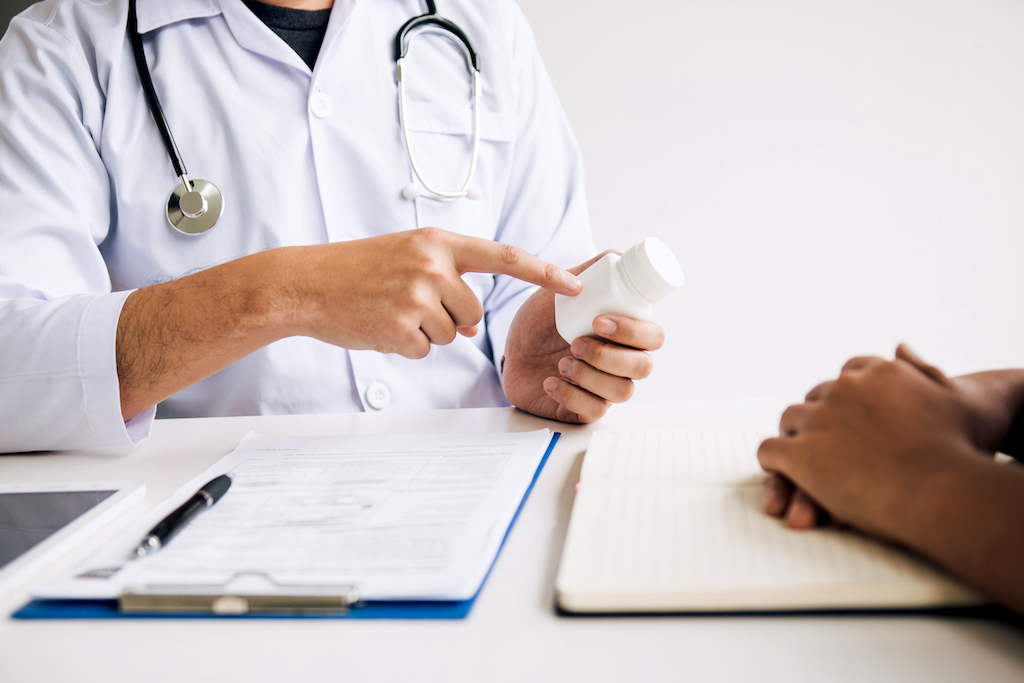 Photo Credit: Shutterstock
Photo Credit: Shutterstock
May is Mental Health Awareness Month, a time when we place a special emphasis on promoting mental health and well-being. However, it’s important to remember that taking care of your mental health is a daily practice. Every day presents an opportunity to be mindful of our mental well-being. In line with this focus, Haute Beauty spoke with Dr. Mike Hoaglin, Haute MD’s mental health expert, to discuss a crucial topic in mental health – medication management.
What types of mental health conditions can be treated with medication?
Prescription medications are usually just one part of managing mental health conditions, and there are many mental health conditions treated with medications. Medications are typically FDA-approved for certain conditions, but medications may be used “off-label” if thought to be medically necessary by your doctor. Ideally, medications are used to relieve symptoms long-term by altering receptors and chemicals in the brain and body. When symptoms are able to go away for a long time (sometimes called “remission”), we can often even stop the medication, and patients can rely on lifestyle modifications for maintenance. Other medications simply mask symptoms and don’t necessarily fix the “root cause” of the issue. These “band-aid” medications are typically used in the short term.
There are hundreds of mental health illnesses, but the most common, broad mental health categories most commonly treated with medications include depressive disorders, bipolar disorders, anxiety disorders, obsessive-compulsive disorders, trauma-related disorders, eating disorders, sleep disorders, substance abuse disorders, and schizophrenia or psychotic disorders.
How do medications work to treat mental health conditions?
Psychiatric medications come in several categories and forms to help people with mental health conditions feel better by changing the levels of chemicals in the brain called neurotransmitters. They help restore balance by increasing, decreasing, or changing the processing of neurotransmitters. Over time, the receptors for these neurotransmitters may change for the better, allowing lasting improvement and potentially tapering off medication. It is important to note that we don’t know the full mechanism of action for many medications, so often we can’t pinpoint exactly how they work. Through research, we know which medications might be more likely to be effective for certain types of patients.
Side effects may occur in the first 2 weeks of starting the common oral antidepressants, and the risks change from person to person. Upset stomach, dizziness, and headache are reported by some patients, and a small number of patients may even temporarily feel worse before they feel better. Some medications have unique risks of adverse effects such as rashes or seizures, but these risks are typically very low and should be discussed with your prescribing doctor.
How can you best manage any medication side effects?
Make sure you discuss this with your prescribing doctor before you start. Generally, if the initial side effects are tolerable, you should be able to “muscle through the first week or so.” If there are any side effects that seem unusual or were not discussed, you should talk to your prescriber.
 Photo Credit: Shutterstock
Photo Credit: Shutterstock
How long does it typically take for medications to kick in?
Traditional oral antidepressants take 3-6 weeks to start working and perhaps longer for the full effect. Some people may need dose adjustments before they work properly. There are some short-term oral medications for anxiety that work within hours, and there are some newer antidepressants that work within hours to days.
What should you do if you miss a dose of medication or accidentally take too much?
This depends on the medication. Dr. Hoaglin advises all his patients to set an alarm to take it at that time every day to keep medication levels more consistent. Usually, if you’re just a little late, you can take it as soon as you remember. Otherwise, just take the next dose. Medications vary widely on how forgiving they are about forgetting to take them. If you miss too many doses for some medications you may need to start back at a lower dose.
How often should you see a doctor for medication management?
This depends on how far into treatment you are and how stable you are. If you are still not feeling how you’d like to be, you should be seeing your psychiatrist at least every month. If you’re more in a maintenance mode, every 3 months is typically reasonable.
What lifestyle changes can you make to support your mental health in addition to taking medication?
There are many and they might be more important than medications because if they aren’t managed, it’s sort of a non-starter. For example, if sleep is insufficient (less than 7.5 hours/night), it will be very difficult for medications to work. Exercise is probably the world’s greatest (free) antidepressant, but it’s hard to get people excited about doing exercise, especially when depressed. But once they discover how great it makes them feel in the morning, it can often become a habit. Dr. Hoaglin also works on special diets such as ketogenic or elimination diets, as blood sugar and insulin levels can affect mental health symptoms.
For more information, visit Dr. Brian A. Levine's social media:

























